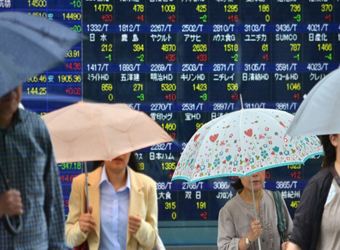Stocks in Asia rose on Tuesday as commodities held onto most overnight gains made on the back of better-than-expected China producer prices.
Japan’s Nikkei 225 rose 0.33 percent, extending a 10-day win streak. The benchmark index had touched a fresh 21-year high in the last session. Most automakers and manufacturing names gained while tech stocks were mixed: SoftBank Group fell 0.83 percent and Line declined 1.78 percent.
Meanwhile, South Korea’s benchmark Kospi index advanced 0.13 percent as steelmakers pared some gains made in the last session. Tech stocks, however, were mostly higher: Samsung Electronics rose 2.15 percent and SK Hynix gained 0.12 percent.
Down Under, the S&P/ASX 200 gained 0.79 percent, with the materials sub-index adding to overnight gains and climbing 1.21 percent. Major miners, banks and oil stocks notched gains in the session.
Greater China markets reversed early losses to eke out slight gains. Hong Kong’s Hang Seng Index advanced 0.18 percent. On the mainland, the Shanghai Composite added 0.06 percent and the Shenzhen Composite tacked on 0.371 percent.
Oil prices were stable after getting an overnight boost on headlines that Iraqi forces had captured parts of Kirkuk, an oil-rich city controlled by Kurdish forces. Brent crude futures were flat at $57.82 a barrel and U.S. crude was 0.13 percent lower at $51.80.
“Traders continue to worry about potential supply disruptions from Iraqi Kurdistan … The threat of escalating tensions in the region should continue to provide support to crude through the remainder of the week,” Jeffrey Halley, senior market analyst at OANDA, said in a note.
Also in the commodities patch, copper prices were steady after surging on Monday when China’s producer price index beat expectations. That metal cracked the $7,000 per ton level in the last session, reaching heights not seen since 2014. Copper last traded at $7,118.
Investors are expecting a “relatively positive backdrop” in the space ahead of China’s 19th Party Congress, which is set to begin Oct. 18, according to ANZ Research.
Meanwhile, the greenback edged up against a basket of rival currencies, with the dollar index standing at 93.359 at 12:05 p.m. HK/SIN. The U.S. currency edged down against the Japanese yen, with the dollar last trading at 112.07.
In other currencies, the euro slid for the fifth straight day following an election in Austria which put right-leaning People’s Party leader Sebastian Kurz on track to becoming the youngest leader in the world.
Catalan leader Carles Puigdemont’s failure to clarify Catalonia’s position on independence from Spain also likely weighed on the common currency, which traded at $1.1777 at 12:09 p.m. HK/SIN, its lowest level in around a week.
Stocks on Wall Street touched record highs on Monday as earnings season carried on. The Dow Jones tacked on 0.37 percent, or 85.24 points, to close at 22,956.96.
Also in the U.S., President Donald Trump met with Stanford University economist John Taylor on Monday in his attempt to find a successor for the position of Federal Reserve Chair, according to Reuters. Trump is due to meet with incumbent Janet Yellen later in the week. Market watchers are also keeping an eye on Jerome Powell and Kevin Warsh — a current Federal Reserve Governor and a former one, respectively — as potential candidates.
Yields on the two-year U.S. Treasury note stood at 1.538 percent on Tuesday after rising as high as 1.546 percent overnight following that development.
In corporate news, the falsification of product data at Japan’s Kobe Steel took place for longer than the 10-year period indicated by the steelmaker, Nikkei Asian Review said. The practice had actually occurred for decades at the company, Nikkei said, citing a source. Kobe Steel shares were last up 6.05 percent after trading near their lowest levels in five years on Monday.
Elsewhere, Tencent Holdings Chairman Ma Huateng has sold part of his stake in the internet company, according to the Wall Street Journal. Ma raised approximately 2.1 billion Hong Kong dollars ($269 million) after he lowered his stake in Tencent to 8.63 percent from 8.69 percent, the WSJ reported. Tencent stock was off 0.17 percent.
In economic news, minutes from the Reserve Bank of Australia showed policymakers were in no hurry to raise interest rates in the country just because other economies were doing so, Reuters said.
Singapore’s non-oil domestic exports in September showed a surprise 1.1 percent decline compared to a year ago, according to government data. That measured against a 12.7 percent gain estimated by analysts in a Reuters poll.
The greenback firmed against the Singapore dollar following the news, fetching as much as $1.3551 compared with as little as $1.3505 in the last session. The Singapore currency traded at $1.3548 to the dollar at 12:11 p.m. HK/SIN. Source: CNBC
Source: CNBC


